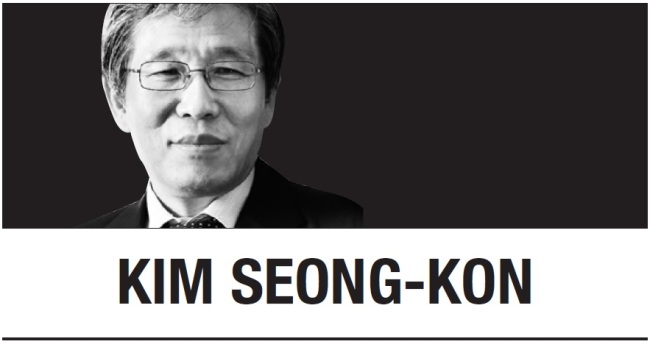
In Han Kang’s prize-winning novel, “The Vegetarian,” the protagonist Young-hye, a weak, helpless vegetarian woman, is surrounded by ferocious and carnivorous men. She has to endure all sorts of violence from self-righteous men who do not tolerate her because they think they are absolutely right and she is wrong.
They even grab her and force her to eat meat. It never occurs to them that they are exercising violence because they firmly believe that they represent justice. To make matters worse, they think they are delivering her from harm’s way by forcing her to give up her vegetarian diet. All the while, they are condescending and exhibit moral superiority.
At the same time, however, a close reading of the novel will also reveal another latent theme that is equally important. Just like the violent men surrounding her, Young-hye, too, firmly believes that she is absolutely right and all others are wrong. One day, she abruptly turns into a vegetarian and throws out all the meat and fish from her refrigerator. She refuses eggs and milk, too. She even throws away her leather shoes. Moreover, she loathes all carnivorous people and even refuses to have sex with her husband, complaining that he has the repulsive odor of a meat eater.
Therefore, in the eyes of Young-hye’s husband, it is he, rather than his wife, who is the victim. Suddenly, he finds he is deprived of not only his favorite meat and fish but also eggs and milk. To make matters worse, he is detested by his wife on account of his odor. To him, therefore, it is his wife Young-hye, not him, who is violent and he is the one who is victimized by his wife’s hysterical frenzy. Indeed, her abrupt change scares him; in the middle of the night, she stands silently in front of the fridge like a ghost and gradually her appearance, too, turns pale due to malnutrition.
Perhaps that is why “The Vegetarian” trilogy is narrated, not by the protagonist, but by her husband, her brother-in-law, and her sister, respectively. While reading the novel, therefore, the reader comes to scrutinize the vegetarian woman from the perspectives of those who are near her, not directly from the point of view of the protagonist herself. The reader is never allowed to enter her mind, which gives the reader an objective viewpoint.
Like all great literary masterpieces, “The Vegetarian” seems to allow a dual perspective. In fact, great films also have a double meaning. For example, the legendary western movie “High Noon” is known to be a critique of McCarthyism. At the same time, however, it can be interpreted as a criticism of Marxism, despite director Fred Zinneman’s intention. The same thing is true of another movie, “Invasion of the Body Snatchers,” which is known to be a critique of Marxism. But it can be seen as a criticism of McCarthyism as well, regardless of director Don Siegel’s intention.
Likewise, we can also assume that even the vegetarian woman’s firm conviction that she is absolutely right can be an act of violence to other people if it is taken to extremes. If she condemns everyone near her as disgusting abominations simply because they are carnivorous, she will be no different from her husband or father who do not embrace diversity. Reading “The Vegetarian,” we criticize the violent, male-Chauvinist, carnivorous people who force the protagonist to give up her faith. Simultaneously, however, we perceive the fact that the vegetarian woman herself can also be a blindly dogmatic person.
Indeed, if any two antagonizing ideologies go to extremes, they may look alike and will eventually become the same. That is, both will end up being dogmatic, hostile and mutually exclusive. We need to embrace both extremes. The solution must be somewhere in between, in “the middle against both ends,” as Leslie Fiedler once put it. Violent clashes cannot be a solution. Violence cannot be justified even though it is committed for justice.
We tend to assume that we can do anything, including violence, for justice. But we may be wrong because it all depends on the nature of justice we are seeking. If it is absolutely necessary for self-defense at a time when our life is at stake, then violence can be legally justified. However, if we commit violence for a grand cause or the greater good, it would be wrong and cannot be justified. As Michel Foucault said, even dictators believe that they represent justice. That is why the definition of justice is often illusive and not crystal clear.
If we delve into “The Vegetarian,” we can find the above-mentioned deeper meaning, regardless of the author’s intention. There are violent people out there to be sure. But we, who criticize them, can also be violent and victimize others if we firmly believe we are the only ones who are pure and impeccable and others are corrupt and contaminated. We should build a serene, peaceful land of the morning calm on the Korean Peninsula, not a violent society.
By Kim Seong-kon
Kim Seong-kon is a professor emeritus of English at Seoul National University and president of the Literature Translation Institute of Korea. He can be reached at sukim@snu.ac.kr. -- Ed.








